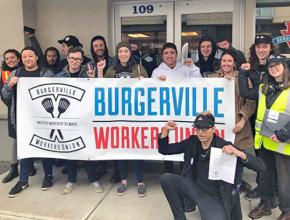Portland fast-food workers win a union
Workers at an Oregon Burgerville franchise voted last week to form a union, and reports that organizers are hoping to build on this victory.
The Burgerville Workers Union (BVWU) in Portland, Oregon, has become the first federally recognized fast-food workers union in the U.S.
With a vote of 18-4 in a National Labor Relations Board election, workers at Store #41 notched an important victory in the drive to organize the 1,500 workers at all 42 Burgerville sites located in Oregon and southwest Washington. BVWU spokesperson Emmett Schlenz says that six of the company's locations now have publicly active unions. Workers at another store have already filed for an NLRB election.
"For a long time people have dismissed fast food as unorganizable, saying that turnover is too high or the workers are too spread out," the BVWU said in a statement. "Today Burgerville workers proved them wrong."
The Burgerville Workers Union was formed two years ago at the initiative of members of the Portland, Oregon, local of the Industrial Workers of the World (IWW).
Unlike the fast-food workers organizing since 2012 with the Fight for 15 campaign funded by the Service Employees International Union (SEIU), the BVWU has no paid staff and hasn't focused on legislative battles for raising the minimum wage.

The IWW is anti-capitalist and sees individual union campaigns as parts of a larger struggle. "Our win today isn't just about Burgerville," declared the union. "It's about history. It's about a movement of workers who know that a better world is possible, and that together they can make that world real."
"In many ways, it's not the fault of Burgerville or its owners," explains the Burgerville Workers Union website. "They operate within a low-wage economy that accepts paying workers near minimum wage as the norm to squeeze everyone for maximum profit...
"This is capitalism, a structure that prioritizes growth and profit over human need and development. We, Burgerville workers, are not merely facing Burgerville, we're facing a whole structure that's bent on pushing us to the edge of what we can bear. We understand this larger structure...and we all face a choice: Do we allow it to continue or do we fight to end it?"
THE UNION has been pressing for a $5 an hour raise, stable scheduling, affordable health care, paid maternity/paternity leave, free childcare and transportation, and an end to the employer's use of e-verify to exclude undocumented immigrant workers.
Using direct action tactics, including mass picketing with community allies, occupations and a three-day strike at four restaurants, the all-volunteer BVWU has drawn the support of dozens of local unions, many community and faith-based organizations and some elected officials.
The union called a boycott of Burgerville after a number of union activists were fired.
"One [firing] was for quote-unquote smelling like pot," said organizer Chris Merkle. "The other was for eating ice cream without permission. People snack all the time, they don't give us a staff meal time, we're hungry, we're broke as hell, we get an employee discount and for some people that's most of their food for the day." The boycott call will remain until workers get a fair contract.
Even then, BVWU organizers are determined to keep up a larger fight. The union's announcement of its victory stated:
In this moment of victory we want to celebrate, yes, but we also want to turn our attention to the 4.5 million other fast-food workers in the United States. We want to speak to everyone else who works for poverty wages, who are constantly disrespected on the job, who are told they aren't educated enough, aren't experienced enough, aren't good enough for a decent life. To all of those workers, to everyone like us who works rough jobs for terrible pay, we say this:
Don't listen to that bullshit. Burgerville workers didn't, and look at us now.


